Review of 'Latria Opus', a game that uses ancient Babylonian astrology as a motif to play a hot game of numbers

Domina Games, known for games such as
LatriaOpus - Domina Games
https://www.dominagames.com/latriaopus/
The LatriaOpus package looks like this.

The game is suitable for 3-6 players, takes 10-20 minutes to play, and is intended for ages 8 and up.

When I opened the lid of the package, I found a message in Latin on the back of the lid that read, 'The stars rule humans, and God rules the stars.'

Inside are three types of celestial body cards. From the left, they are The Sun, The North Star, and The Moon.

And an astrology card with a purple back.

There are four types of celestial boards, a parent marker with 'MAGISTER' written on it, and five eclipse markers.
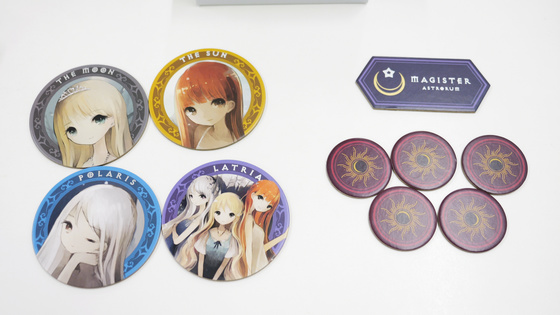
Prepare for the game. If you are playing with 3 players, remove the astrology cards with the numbers '4' and '5' written in the bottom right corner, and if you are playing with 4 players, remove the card with the number '5' written in it. Since we are playing with 4 players this time, remove the card with the number '5' written in it. There are 4 types of astrology cards, with the numbers 1 to 15 in the upper left corner, but if you are playing with 4 players, the numbers of each type will be '2 to 13'. Note that there is no need to remove any cards if you are playing with 5 to 6 players.
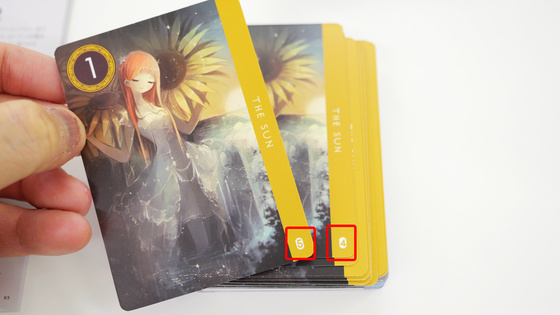
After removing the designated cards, shuffle the astrology cards thoroughly and deal them to each player as their hand.
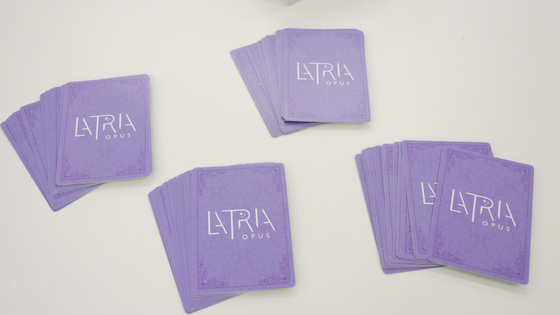
Place the celestial body board with the Sun, Moon, and North Star in the center of the table, and shuffle the corresponding celestial body cards underneath it and set them as a deck.
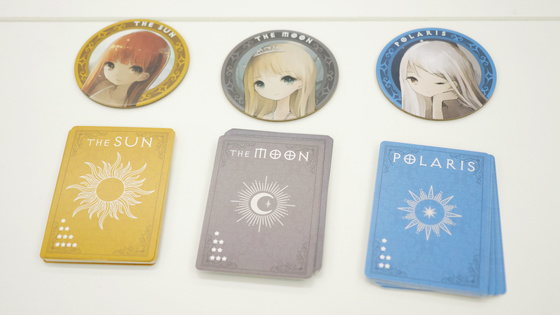
Place an eclipse marker for each person to the side. Then you're ready to go.
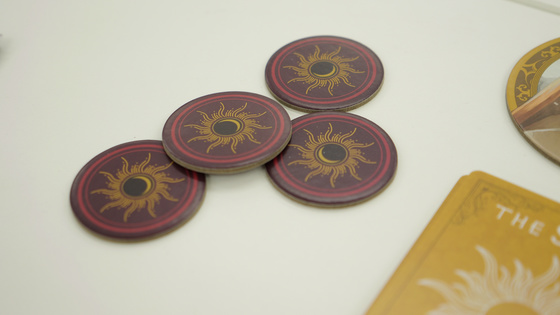
The person who knows the most about astrology receives the parent marker and the game begins.

First, place one card from each deck on the celestial board. The number of stars written on the card is the victory point, and the person who has collected the most stars at the end wins. Victory points are calculated for each type of card.
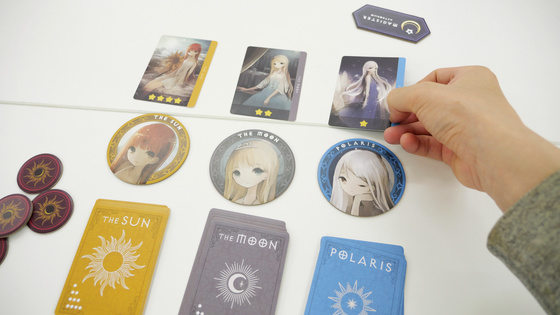
The way to take a star is simple; whoever plays the astrology card with the highest number from their hand wins. First, the dealer chooses one card from their hand and puts it on the table open. At this time, they must either play an astrology card that corresponds to the celestial body card they want, or they must declare the target celestial body while playing a Latria astrology card. In this case, the dealer declared, 'I'm taking the sun,' and played a Latria '12' card on the table.
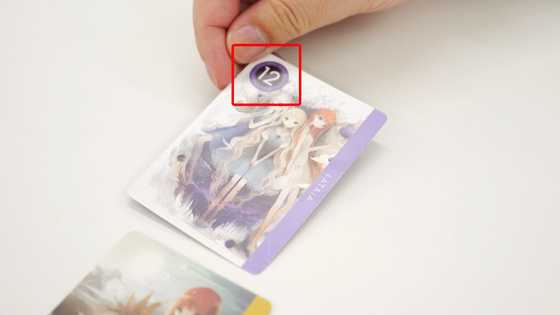
After looking at this, the child chooses an astrology card from their hand and places it face down on the table. This time, the cards that can be played are 'Sun' or 'Latoria'. Once everyone has played their cards, they all turn them on at the same time and check which number is larger. In this case, the parent has played the 'Latoria' 13 and the child has played the 'Sun' 13. If the numbers are the same, the card that is not Latria wins, so the child player wins.
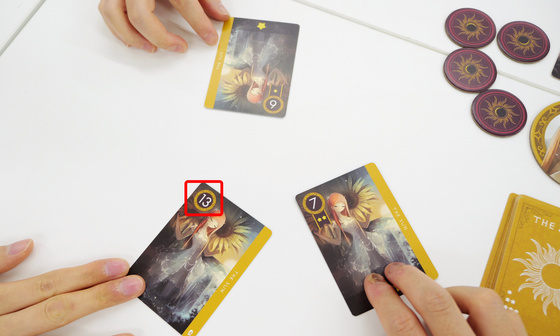
The winning player receives the parent marker and gets a celestial body card. The celestial body card you get is a victory point, so you place it face down in front of you.
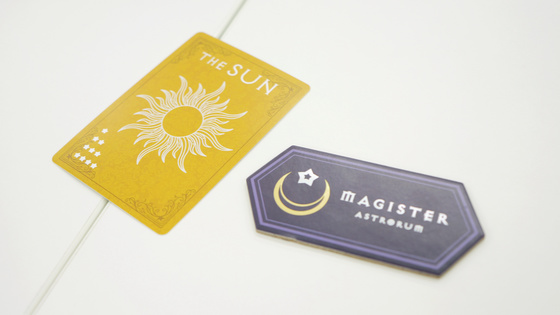
Then, the cards you played and the cards your dealer played are placed aside as a discard pile. The discard pile is placed face up, so all players can check which cards have already been discarded.

If a child loses the astrology card number battle, the astrology card they played becomes their victory point. Some astrology cards have victory points written on them, so if you know you can't take the celestial card, you can play an astrology card with victory points and lose to get your victory points.
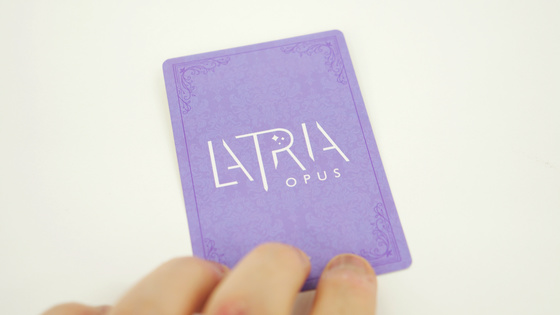
Once the card acquisition process is complete, the round ends. Flip one card from each deck and stack them one by one on the celestial board. If the parent does not select a celestial body, more and more celestial body cards will be piled up on that celestial body, so there is a possibility that you can get a large number of victory points at once.
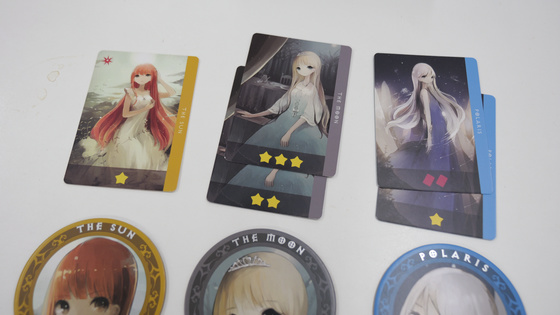
However, the accumulated victory points do not necessarily work in your favor. Some celestial body cards have a red 'eclipse mark' in the upper left corner.
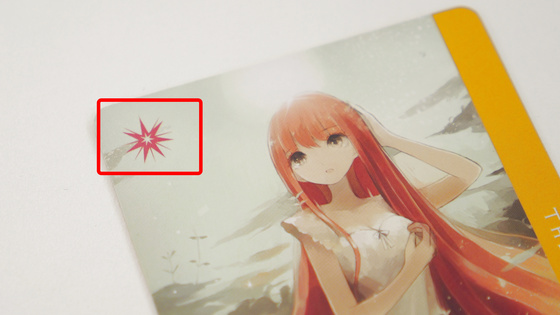
When a card with this eclipse mark is played, the celestial board is turned over. When the celestial board is turned over, it looks like this. It has become 'ECLIPSE', that is, 'eclipse'.
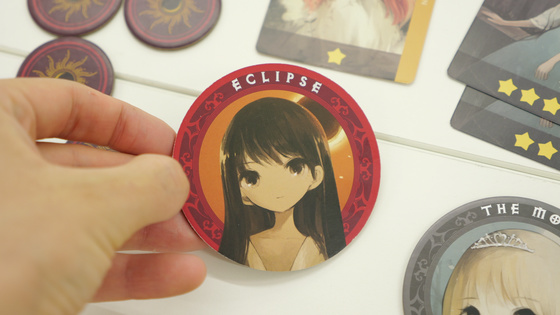
If an eclipse card is played on a celestial body, the victory points will become negative if the celestial body acquires it.
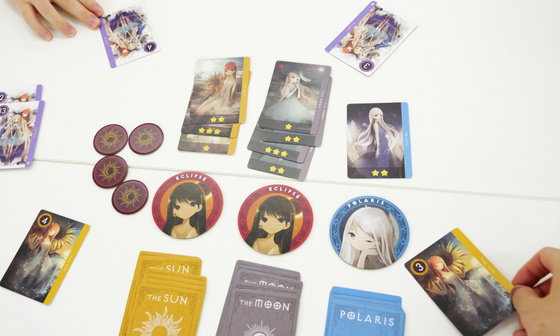
When you place a celestial body card that has an eclipse card in it, place an eclipse marker on top of it. After that, any celestial body cards you acquire from the eclipsed celestial body are stacked under the eclipse marker.
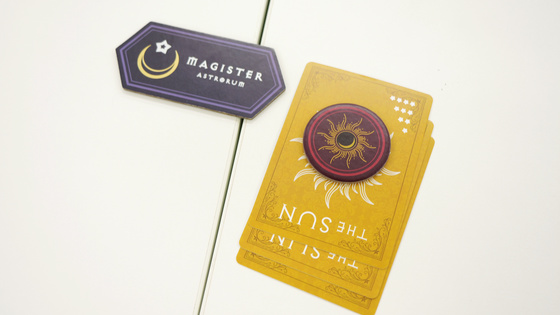
If you take a card that is in an eclipse state, you may lose a lot of points at once. Therefore, while you would normally want to play astrology cards with high numbers in order to win, the situation changes to one where you have to play cards with as low numbers as possible. If you keep astrology cards with high numbers in your hand, your situation will become difficult all at once.
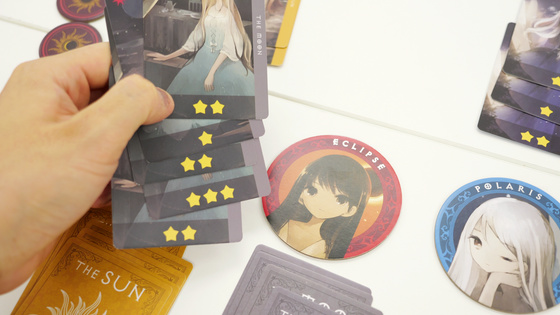
Some celestial body cards also have a multiplier written on them. This is a multiplier of 'x0'. If you add this to your victory points, the points held by the Sun card will become 0, but if you get it as an eclipse card, all of the negatives on the eclipse card will become 0. In this case, a celestial body card with a 'x0' value was placed on the eclipsed Sun.
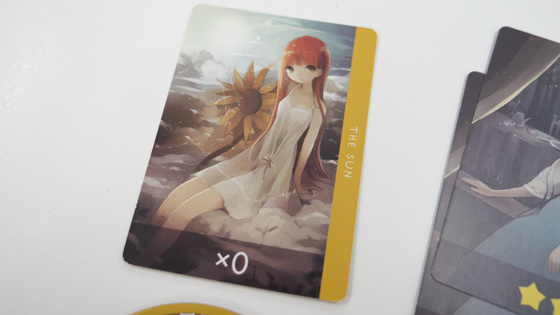
At this time, the parent had collected a large number of eclipse cards, so they wanted to somehow get this 'x0' card. The discarded astrology cards that had already been played looked like this. Since there were four players this time, there was one of each type of astrology card, from '2' to '13'. The '13' and '12' sun cards had already been discarded, so the maximum sun astrology card was '11', which had never been played yet.

In other words, if you play the Sun '11', you will definitely get the 'x0' celestial card. The parent who happened to have the Sun astrology card '11' showed it.
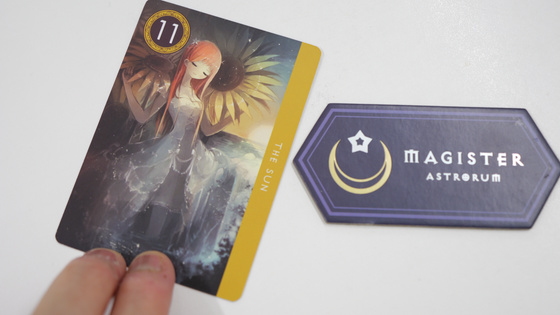
If a child realizes that they cannot win, they give up and play an astrology card that will give them victory points. The strategy is to intentionally lose in order to gain some victory points from the cards in their hand.
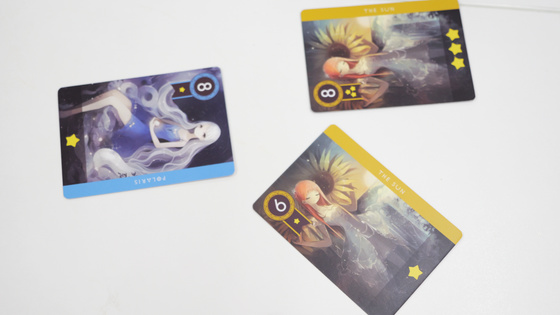
In this way, players keep fighting over cards, and the game ends when there is only one card left in hand. At that point, each player's victory points are calculated. Divide the cards in hand by type of celestial body, calculate the points for each celestial body, and add up the total to become the final victory points. For example, the player below mainly collected North Star cards, and also got a 'x2' card, so he earned 18 points just from the North Star card. He also earned 2 points from the Latria card and 1 point from the Sun card, so he earned a total of 21 points.
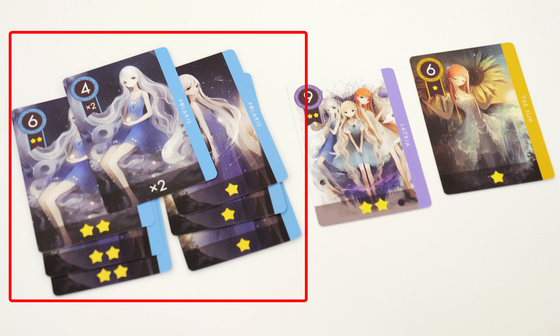
This player had a card worth 17 points under the eclipse marker, so he lost 17 points. He got 7 points from other cards, but the losses were greater, so he lost 10 points in total.
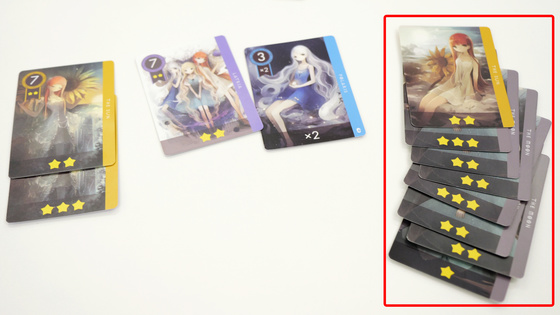
And the player who had 26 points x 2 = 52 points under the eclipse marker had all of his minuses reduced to 0 by adding the 'x0' card to his eclipse card. Although he couldn't take first place, he was able to erase all of his huge deficit.
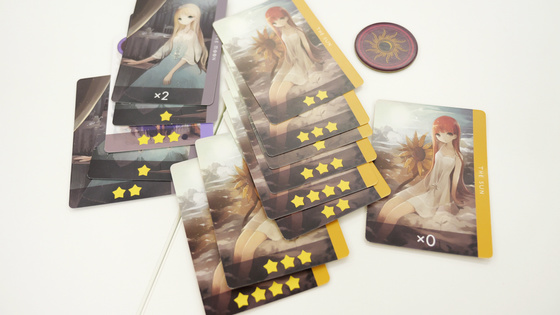
Latria Opus has simple rules, making it a fun and easy party game for both children and adults. There is only one card of each type with the numbers 1 to 15 written on it, so counting is key to predicting which cards will be played and what cards your opponent is likely to have, but the cards you will be dealt first and the celestial cards that will be turned over are all down to luck, so not only counting but also probability plays a big role in how the game plays out. Having large astrology cards is advantageous, so I felt that knowing when to play strong astrology cards is the shortcut to becoming a good astrologer.
Latria Opus also has an expansion rule, and a simpler rule with only one celestial board. Compared to the standard rule, the amount of thinking is reduced and the difficulty is slightly lower, so it is recommended to play with this expansion rule when playing with people who are not familiar with board games or small children. There is also a high difficulty mode that switches all boards to eclipses, so it is recommended for those who want a harder challenge.
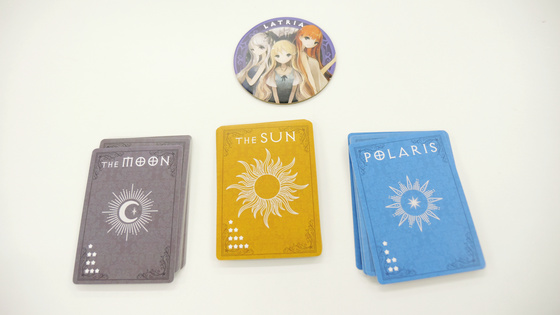
Latria Opus will be released on Friday, May 23, 2025, and the price is 2,970 yen including tax. At the time of writing, Amazon.co.jp offers a 7% discount on the following page, with a price of 2,764 yen including tax.
Amazon.co.jp: Domina Games Latria Opus (3-6 players, 10-20 minutes, ages 8 and up) Board Game, Old Capital Nagi: Toys

Related Posts:







